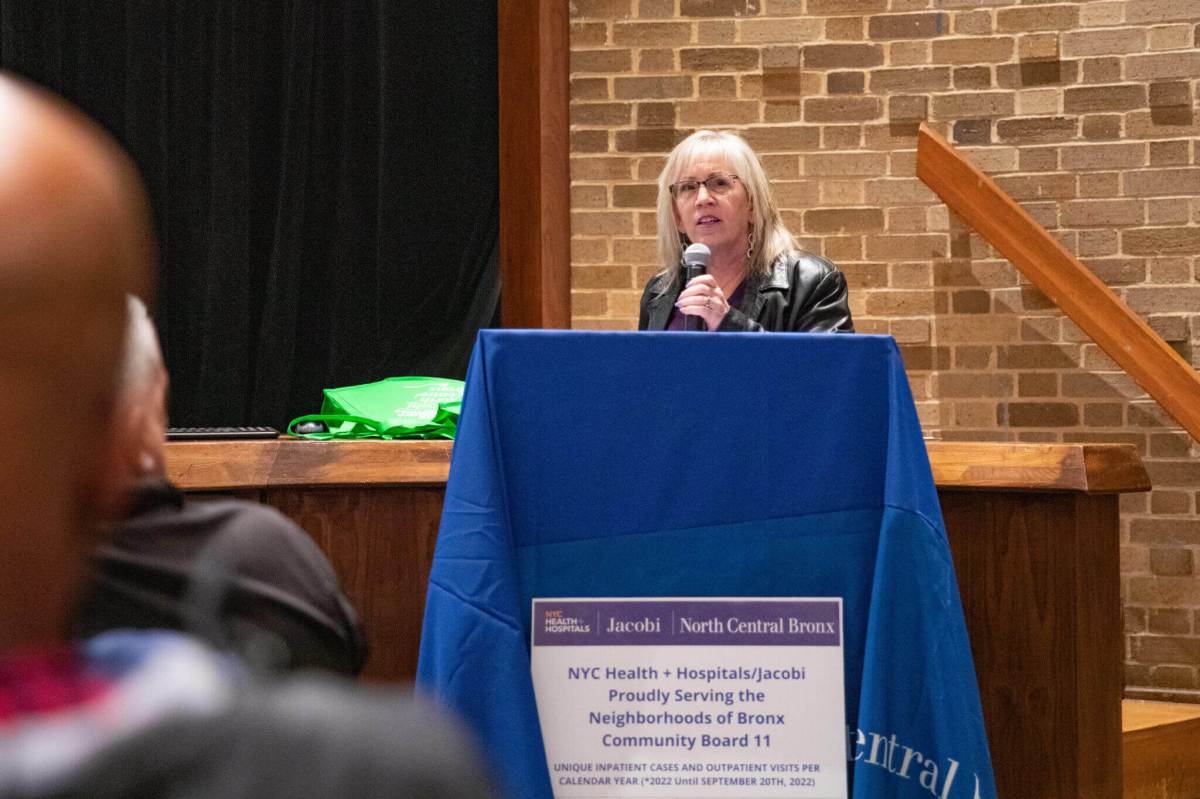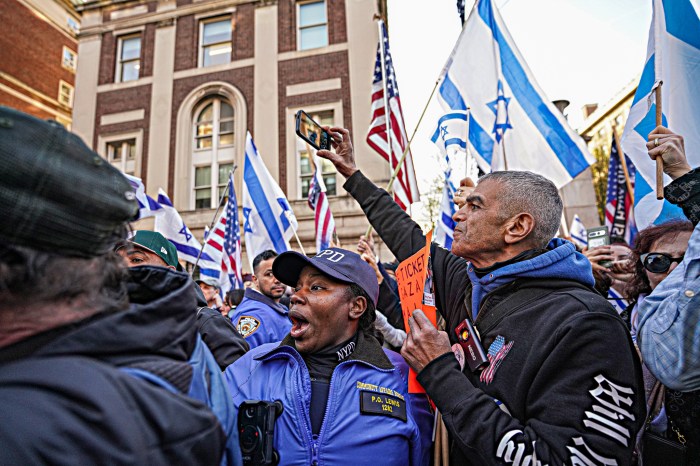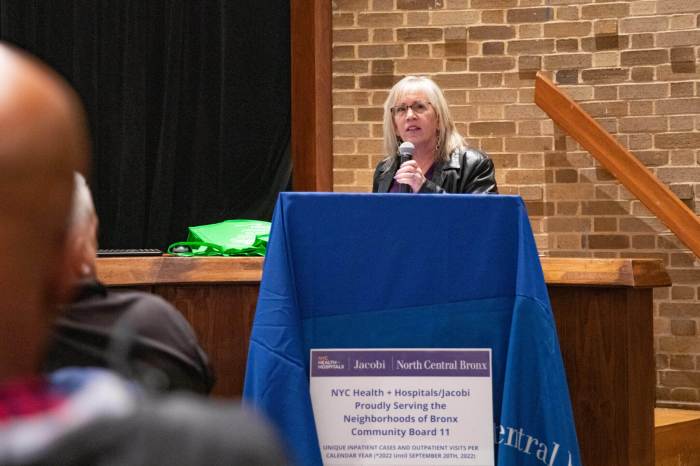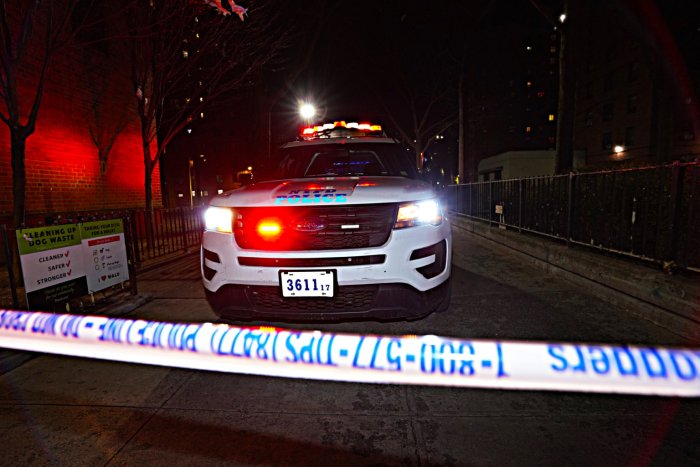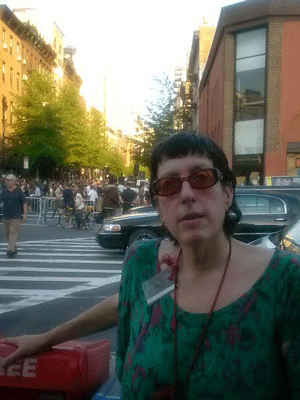
BY LINCOLN ANDERSON | Jessica Berk — who sprang into the spotlight more than a decade ago with her controversial quality-of-life group Residents in Distress, or RID — was recently in distress herself when she was arrested after a gun was found in her Christopher St. apartment.
According to police, the firearm was discovered on Mon., March 31, around 11 a.m. Berk confirmed this. In fact, it was actually she who called The Villager to report the news.
Detective Jimmy Alberici, a Sixth Precinct community affairs officer, said a “court-ordered cleanup” of Berk’s apartment, which she shares with her mother, who is in her 90s, was going on at the time.
“One of the people hired to do the cleanup found the gun under a cabinet,” he said.
Alberici said the weapon was a small-bore Jennings.
Since it was unloaded, Berk was only charged with misdemeanor criminal weapon possession in the fourth degree.
“I don’t know what caliber,” Alberici said. “It looked like a .22 or a .25. It was in good condition. It wasn’t a Civil War gun. She didn’t have a license, and she claimed she didn’t know it was there.”
Berk gave The Villager her account of what happened. Basically, she said, police were outside the apartment during the cleanup due to “an ongoing landlord / tenant thing with my mother.”
Jessica Berk, 55, was born in the two-bedroom rent-controlled apartment. When the gun was found, she said, her mother was not at home but was doing a stint in physical rehab for a few weeks for her knee. Berk admitted the place was pretty cluttered.
“It wasn’t really filled to the rafters, but it was halfway there,” she said, “mostly filled with memorabilia and artwork.”
According to Berk, her family has had a rocky relationship with the building’s management.
Berk said a bunch of workers and inspectors were going in and out of the apartment in the weeks before the gun was found.
“A number of workers were in the apartment, in and out for weeks and weeks,” she said. “They were moving out stuff for weeks. They threw out my mother’s table, furniture.
“Apparently someone discovered a gun. They said it didn’t have a magazine, so it wasn’t a — what’s that word? — a felony.”
Berk denied prior knowledge of there having been a firearm in her apartment, saying it came as news to her.
“[It was] to my surprise, yeah,” she said. “I don’t own a gun.”
Asked if she knew what type of pistol it was, she said, “I’m pretty nearsighted. I didn’t get a good look at it. It looked like a tiny, little toy.”
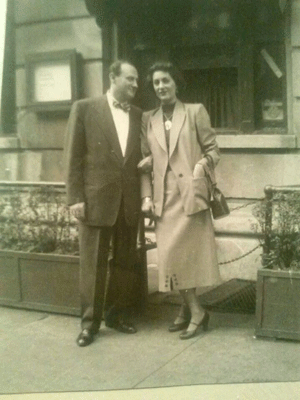
Contrary to what Alberici called a gun in good shape, Berk stated, to her, it appeared “old and dusty.”
She said when she entered the apartment, she saw the handgun on the ground, by the door.
“He was pushing it with his foot,” she said. It wasn’t clear if she was referring to one of the workers or an officer.
“I heard one of the officers say it had been there for years,” she added. “I heard it was found in the file cabinet — it was behind a table, it fell from a drawer.”
She said, after the gun was discovered, it then took around an hour and a half before anything happened because police were busy speaking on the phone to “Legal” about it.
She was then taken to the Sixth Precinct and read her Miranda rights.
She said she was then held 11 hours at the precinct, during which she was “shackled to a bench” — except for a break when a detective questioned her — and not allowed to use the bathroom or get a drink of water for several hours until there was a change of shift.
“According to my lawyer, it’s a fabulous case,” she said. “I’ll have another federal case.”
Berk noted her lawyer wants to collect DNA evidence as part of the defense.
Next, Berk was taken down to Central Booking and put into a group holding cell.
“It was filthy,” she said. “The people in there were all repeat criminals — a lot of domestic violence. But compared to my treatment at the Sixth Precinct, it was preferable.”
Her next court date is May 15.
Berk definitely has a love-hate relationship with the Sixth. She has sued the precinct in the past for false arrest, and has another open suit against it. Yet, she also, at one point, sought to have a baby with one of its officers through artificial insemination, but the wish was unrequited. The officer also happened to be gay.
So, in fact, was another one of the men atop Berk’s sperm-donor wish list, Randy Wicker, a gay cloning advocate who formerly owned a Christopher St. lighting store. Wicker ultimately also declined Berk’s offer — even though she assured him he wouldn’t bear any financial responsibility for their child — because, he said, he feared her litigious nature.
Berk also wondered if the gun could have possibly been tied to her father, Leo Berk, who from 1950 to 1970 ran a popular restaurant / lounge and music venue, the Waverly Lounge, in the former Hotel Earle, now the Washington Square Hotel.
“He dealt with a lot of gangsters,” she said. “There was a dive hotel there. It wasn’t exactly a hooker hotel, it was classier.”
A lot of her apartment’s clutter is actually photos of then-budding stars like Barbra Streisand and Phyllis Diller who used to frequent the Waverly Lounge, Berk noted, material that her mother, Ruth Berk, eventually wants to give to her.
Her dad once had to eject infamous gangster figure Crazy Joey Gallo.
“My father threw him out,” she recalled. “Bartenders were being threatened, and his hat-check girl, named Faye, was a redheaded, huge-titted…he was grabbing her ass. Joey Gallo always would get drunk. He was a mean drunk.”
Gallo later met his end when he was gunned down at Umberto’s Clam House in Little Italy. Meanwhile, Berk’s dad later worked at a liquor store near St. Vincent’s Hospital.
As for Berk’s complaint of being handcuffed to a railing at the Sixth Precinct, a precinct source said, “That’s standard procedure. Because she’s a female, we’re not going to put her in a cell — to keep her separate from anyone who might have been in the cell.”
The source requested anonymity due to Berk’s history of suing.
As for why Berk was, in her words, “shackled” at the precinct for nearly half a day, the source said, “It’s ‘handcuffed,’ not ‘shackled.’ … Maybe [the length of time] was because she had a gun. They had to do an investigation. It takes a while.”
Berk said her father died in 1979 or 1980. She said maybe it indeed was his gun and he left it to her mom. According to Wikipedia, the Jennings J-22 — an inexpensive .22- and .25-caliber handgun — was produced by the Jennings Corporation in California in the 1980s and 1990s.
Berk was in the news back in 2002, when her new group, Residents in Distress, raised alarms about what she and others called a surge of drug use and prostitution on the Village’s streets. The Meat Market’s morphing into an entertainment zone had pushed the transgender hookers south from their traditional stomping ground into the Village at night.
But RID and its allies were rebuffed by the area’s local elected officials — three of whom were gay or lesbian — and many established activists, who felt the “sex workers” needed protection not prosecution, and that calls for tougher policing of the L.G.B.T. youth who frequent Christopher St. and the pier were racist.
Berk later launched an effort to form a new business improvement district, the Christopher St. Partnership. The proposed BID has yet to go through the required process to obtain city approval.












